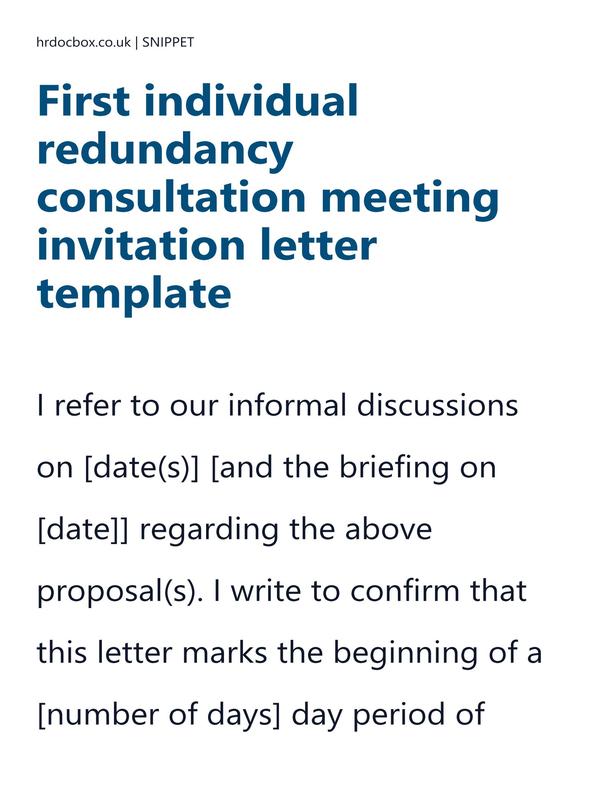First individual redundancy consultation meeting invitation letter template


If you need to initiate redundancy consultation with an employee who has been provisionally selected for redundancy, send this model letter to invite them to a redundancy consultation meeting.
This letter also details the background and rationale for the proposal(s), the summary of proposal(s), the potential implications for the employee and the method of selection.
- Includes 12 months' access to the First individual redundancy consultation meeting invitation letter template, with all updates provided free of charge and notified to you.
- UK-specific accuracy.
- 638 words over 2 pages.
- Last updated 07/10/2025.
- Format: Word / plain text / email.
- Delivery: Instant download after purchase (no physical item).
- Access: Download link shown here after checkout.
- This First individual redundancy consultation meeting invitation letter template will SAVE you up to 1 hour 30 mins drafting & research, save you money, and reduce your risk.
[Sender name]
[Sender address]
[date]
[Recipient name]
[Recipient address]
Dear [Recipient first name],
Re: Proposed (change e.g. merger of...)
I refer to our informal discussions on [date(s)] [and the briefing on [date]] regarding the above proposal(s). I write to confirm that this letter marks the beginning of a [number of days] day period of formal consultation with staff affected by the proposal(s). This period of consultation will end on [date].
I am writing to explain how the proposed change(s) will affect you, and to invite you to submit any comments or questions you may have on the method of implementing the new structure, or on your own personal situation. I am conscious of how important it is to use the insight and suggestions of those directly involved in this [area/ service/ discipline] to inform and refine my plans and I would welcome therefore, any comments or suggestions you have. Your feedback can be given directly to me or HR Services.
Background and rationale for the proposal(s)
[Briefly summarise reason for change]
Summary of proposal(s)
[Briefly summarise proposal].[I attach a copy of the consultation document and draft job descriptions for your information.]
Implications for your post
Unfortunately, the effect of the proposal(s) is that your current post as [Job Title of employee] will
This is a 30% preview of the First individual redundancy consultation meeting invitation letter template. For instant full access, purchase this item or a parent bundle.
First individual redundancy consultation meeting invitation letter template purpose
A first individual redundancy consultation meeting invitation letter is sent to an employee who is at risk of redundancy. The purpose of the letter is to invite the employee to a meeting to discuss the possibility of redundancy and to explore any potential alternatives.
It is important to note that the first individual redundancy consultation meeting invitation letter is just the first step in the redundancy consultation process. The employer is required to follow a fair and transparent process when considering redundancies, which includes consulting with affected employees and exploring alternatives to redundancy before making any final decisions.
Practical application of a First individual redundancy consultation meeting invitation letter template
- The First individual redundancy consultation meeting invitation letter template should be actioned / delivered as soon as reasonably practical.
Compliance
Compliance
This First individual redundancy consultation meeting invitation letter template incorporates relevant UK laws and HR standards, including those listed below:
-
The Employment Rights Act 1996: This legislation outlines the rights of employees in relation to redundancy, including the requirement for employers to consult with affected employees.
-
The Equality Act 2010: This act prohibits discrimination on the grounds of certain protected characteristics, such as age, gender, race, disability, and sexual orientation. Employers must ensure that their redundancy selection process does not discriminate against employees on any of these grounds.
-
The Trade Union and Labour Relations (Consolidation) Act 1992: This act sets out the legal framework for collective consultation in the event of redundancies. If an employer is proposing to make 20 or more employees redundant within a 90-day period, they must engage in collective consultation with any trade union or employee representatives.
-
The ACAS Code of Practice on Disciplinary and Grievance Procedures: This code provides guidance on good practice for conducting consultation meetings and handling redundancies. Employers should aim to follow this code to ensure that their procedures are fair and reasonable.
-
The Working Time Regulations 1998: This legislation sets out the maximum number of hours that employees can work each week, as well as minimum rest breaks and annual leave entitlements. Employers must ensure that any changes to working patterns or hours as a result of redundancy do not breach these regulations.
If you are making up to 19 redundancies, there are no rules about how you should carry out the consultation, although it is good practice to consult with anyone at risk of redundancy before any final decision is made.
If you are making 20 or more redundancies at the same time, consultation should take place with a representative (rep).
There is no time limit for how long the period of consultation should be, but the minimum is:
- 20 to 99 redundancies - the consultation must start at least 30 days before any dismissals take effect
- 100 or more redundancies - the consultation must start at least 45 days before any dismissals take effect (90 days in Northern Ireland)
First individual redundancy consultation meeting invitation workflow
First individual redundancy consultation meeting invitation workflow
Check which resources should be implemeted before and/or after the First individual redundancy consultation meeting invitation letter template, to understand the workflow.
Redundancy selection criteria matrix form
Use this model redundancy selection criteria matrix to set out the criteria that will be applied in deciding which employees to make redundant.
First individual redundancy consultation meeting script
Our First Redundancy Consultation Meeting Script Template enables structured discussions, addressing employee concerns professionally at the start of the process.
Frequently Asked Questions about a First individual redundancy consultation meeting invitation letter template
Frequently Asked Questions about a First individual redundancy consultation meeting invitation letter template
-
Can I use the First individual redundancy consultation meeting invitation letter template in my small business?
Yes. The First individual redundancy consultation meeting invitation letter template is designed to be flexible and suitable for organisations of all sizes, including small businesses and charities. It follows UK employment law best practice, so even if you don't have an in-house HR team, you can confidently apply it.
-
Is the First individual redundancy consultation meeting invitation letter template compliant with 2026 UK employment law?
Absolutely. Like the First individual redundancy consultation meeting invitation letter template, all of our templates are drafted with the latest ACAS guidance and UK employment legislation in mind. We review and update them regularly, so you can be confident they remain compliant.
-
Can I customise the First individual redundancy consultation meeting invitation letter template for my organisation?
Yes, we highlight the areas of the First individual redundancy consultation meeting invitation letter template that you need to update with your own details, and where you need to make decisions to suit your situation. This saves you time and ensures that you meet best practice.
-
Do I get instant access to the First individual redundancy consultation meeting invitation letter template?
Yes. Once purchased, you'll be able to download the First individual redundancy consultation meeting invitation letter template instantly. Templates are provided in editable Word or Excel format so you can customise them easily, and in PDF format for easy sharing.
-
What if I need more help, not just a First individual redundancy consultation meeting invitation letter template?
If you're looking for broader support, we also offer toolkits and library bundles that include the First individual redundancy consultation meeting invitation letter template, along with other HR templates and policies for fully managing your situation. These may be more cost-effective if you need deeper advice.
-
Why should I use this First individual redundancy consultation meeting invitation letter template, and not AI to generate it?
The risk of using a free AI-generated template 'without review' includes your legal exposure, missing context, and no awareness of the wider process, whereas purchasing the First individual redundancy consultation meeting invitation letter template from us mitigates that risk.
